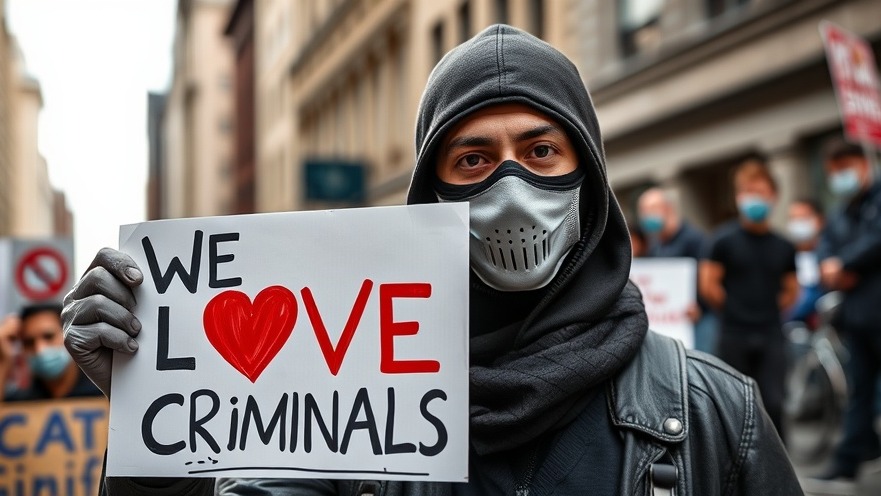
Understanding Operation Midway Blitz: A Dedicated Initiative by DHS
This week, in a significant move aimed at addressing immigration concerns, the Department of Homeland Security (DHS) announced the commencement of Operation Midway Blitz in Chicago. The operation is a direct response to the perceived influx of criminal illegal aliens in the area, which the DHS attributes to the sanctuary policies enacted by the state’s leaders.
The announcement came as part of a broader effort to enforce immigration laws in the city, with the DHS emphasizing that the focus of the operation is on what they describe as the “worst of the worst” criminal illegal aliens. According to spokesperson Tricia McLaughlin, this initiative highlights the government's commitment to enhancing public safety by targeting individuals deemed to be a risk to community integrity.
Governor Pritzker's Response: A Call for Collaboration
In the wake of the operation's announcement, Governor J.B. Pritzker expressed his concerns regarding the lack of federal communication. Pritzker criticized the Trump administration's approach, asserting that effective crime-fighting necessitates cooperation between federal, state, and local governments. “Instead of taking steps to work with us on public safety, the Trump administration's focused on scary Illinoisians,” he said, reflecting the frustrations of many local leaders regarding federal immigration policy.
Moreover, Mayor Brandon Johnson articulated caution over potential militarized enforcement actions, highlighting historical patterns of human rights abuses associated with ICE operations. The mayor's words resonate with the community's fears regarding due process and treatment during enforcement actions, as he stressed the need for a balanced approach that truly prioritizes public safety.
Emotional Impact: Families Affected by Policy Shifts
The emotional repercussions of immigration enforcement are palpable, especially for families torn apart by policy shifts. Case in point, the DHS's current operation honors Katie Abraham, a victim of a fatal drunk driving hit-and-run crash, whose family seeks justice and safety. Her father, Joe Abraham, hopes that no other family has to endure such grief, advocating for stricter regulations to ensure public safety on roads.
His tragic story underscores the urgency behind Operation Midway Blitz; it reflects a broader sentiment shared by many who feel the impact of crime directly. His remarks serve as a connecting thread among those advocating for increased enforcement and those calling for comprehensive immigration reform.
The Future of Immigration Enforcement: Trends and Predictions
The announcement of Operation Midway Blitz raises critical questions about the future of immigration policy in the U.S. As various stakeholders weigh in, one can anticipate potential shifts in local and national discourse surrounding sanctuary cities and federal enforcement practices. The political landscape is evolving, and both sides of the aisle have much at stake.
Experts suggest that this could signify a renewed focus on border control and immigration enforcement under the Trump administration, especially as the 2024 elections draw nearer. This comes at a time when public opinion seems to sway in favor of bolstering security measures, spurred by incidents that lead to tragic outcomes.
Challenges Ahead: Balancing Safety and Rights
The challenges facing the DHS as it moves forward with Operation Midway Blitz are steep. While the intent is to safeguard communities from criminal conduct, the potential for civil liberties violations remains a critical concern. Advocacy groups fear a heightened climate of fear within undocumented communities, which could deter individuals from seeking essential services or reporting crimes. It presents a classic dilemma — how does one ensure public safety without eroding civil rights?
The juxtaposition of enforcement actions with community safety protocols calls into question the methodology and implications of the operation. By addressing root causes rather than purely punitive measures, long-term solutions might emerge to foster a safer, more inclusive society.
Actionable Insights: What Can You Do?
In light of the ongoing developments surrounding Operation Midway Blitz and its implications, individuals interested in advocating for fair immigration policies may consider a few actionable steps. Engaging in community discussions, supporting local initiatives that advocate for both safety and rights, and staying informed about legislative changes are vital parts of fostering constructive dialogue.
Moreover, volunteering with organizations that assist affected families can notably transform narratives while promoting understanding and cooperation. As we navigate these complex issues, every small effort contributes to the larger conversation on immigration and community safety.
In conclusion, Operation Midway Blitz represents a pivotal moment in the ongoing dialogue about immigration policy. As local leaders and citizens engage with the realities of enforcement actions, it is essential to weigh the implications carefully — prioritizing human dignity while addressing legitimate safety concerns.
Call to Action: Stay informed and engage actively with your community regarding immigration policies. Your voice matters in shaping a balanced and effective approach.
 Add Element
Add Element  Add Row
Add Row 



Write A Comment